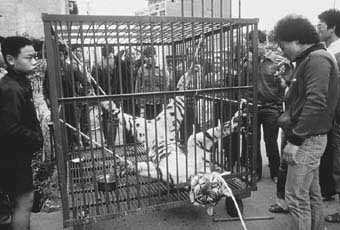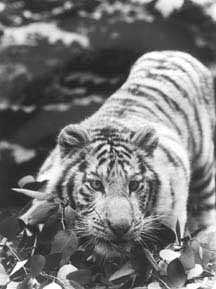Follow the trade in endangered species, and chances are you'll end up in Taiwan. For tigers, rhinos, and a host of other species, Taiwan is the last stop on the road to extinction.
Unless...
Earth Island's Endangered Species Project is leading an international coalition of environmental groups in an aggressive campaign to force Taiwan to close its borders to the illegal trade in endangered species, crack down on poachers, and put the dealers out of business.
Here's how you can help...


Estimated tiger population
Indochinese tiger 1,000 Indian or Bengal tiger 3,000 Siberian tiger 200-250 South China tiger 30-50 Sumatran tiger 400-650 Javan tiger extinct in 1980s Caspian tiger extinct in 1970s Bali tiger extinct in 1940s Total 4,630-4,950
1. Don't buy goods made in Taiwan.
Look for the "Made in Taiwan" label. If you don't know where it was made, ask. Tell shop owners why you refuse to buy any goods from Taiwan and encourage them to do the same. Taiwan's dependence on U.S. markets means that American consumers can force Taiwan to clean up its act. Whatever else you do, boycott Taiwan! Let Taiwanese companies know what you think about Taiwan's wildlife trade. Acer (computers), Giant (bicycles), and Tatung Corporation (microwave ovens and televisions) are the three major companies to target. Write them to demand that Taiwan halt the slaughter of endangered species and to let them know that you'll be shopping with other companies until Taiwan stops the trade.
2. Tell President Clinton to impose sanctions.
Taiwan fears international trade and diplomatic sanctions. Please write to President Clinton and demand that the United States pressure the government of Taiwan to halt the illegal trade of endangered species by strictly enforcing its own laws and CITES regulations. Insist that the Interior Department certify Taiwan under the Pelly Amendment and that President Clinton impose trade sanctions against Taiwanese imports. Tell them that you support a suspension of trade against Taiwan and will not buy Taiwanese goods until these conditions are met. Let them know America will not subsidize this slaughter any longer.
3. Support the Endangered Species Project.
Over the past two years, Endangered Species Project investigators have traveled to Taiwan, China, Russia, Burma, Laos, Cambodia, Thailand, Hong Kong and Vietnam, documenting the illegal black market trade in endangered species. Our field investigations provide up-to-date information to CITES, Congress and government bodies, and could be the deciding factor in securing sanctions against Taiwan and other countries trading in endangered species. In the months ahead we'll be taking our campaign against Taiwan to Washington and the European Parliament to enlist the support of legislators, other conservation groups and corporations in sanctioning Taiwan and forcing compliance with international wildlife treaties. We'll also be attempting to block the entry of Taiwan into the Global Accord on Tariffs and Trade (GATT) until Taiwan becomes a responsible member of the international conservation community. We rely on the contributions of people like you to support our campaigns. So please support the Endangered Species Project's work with a tax-deductible donation.